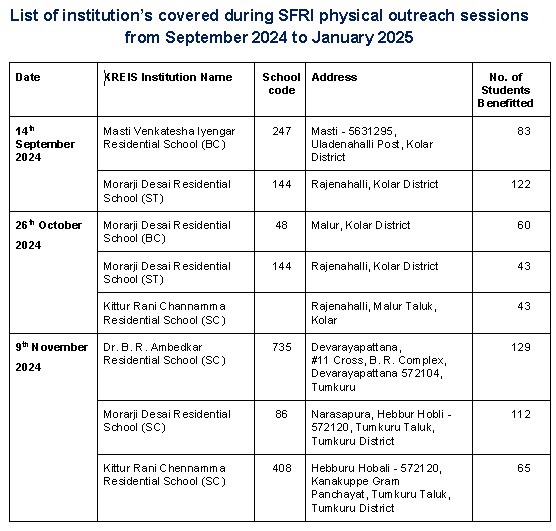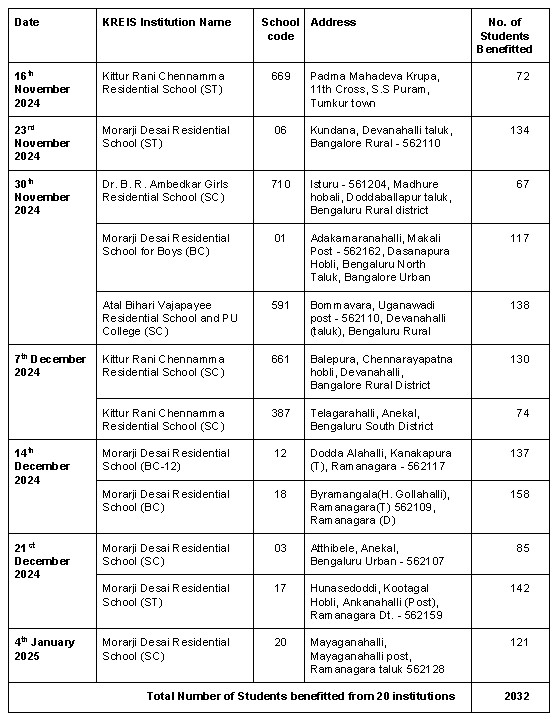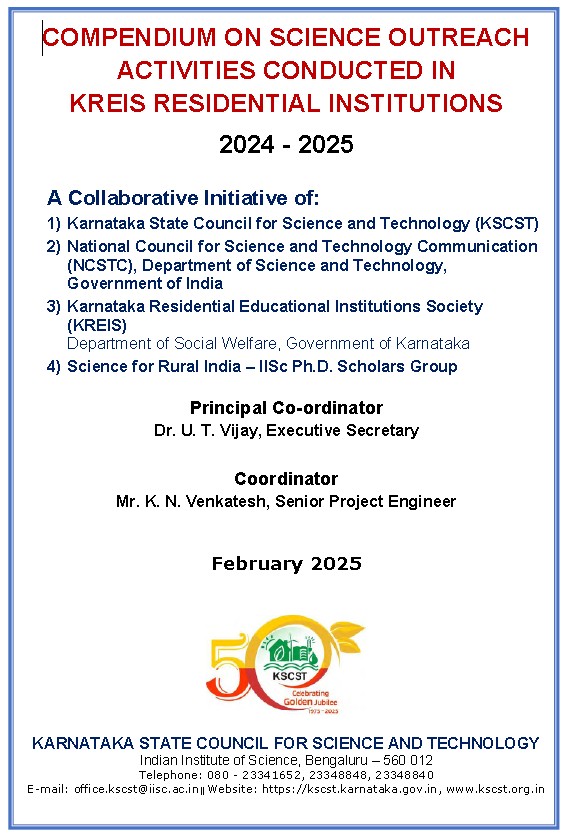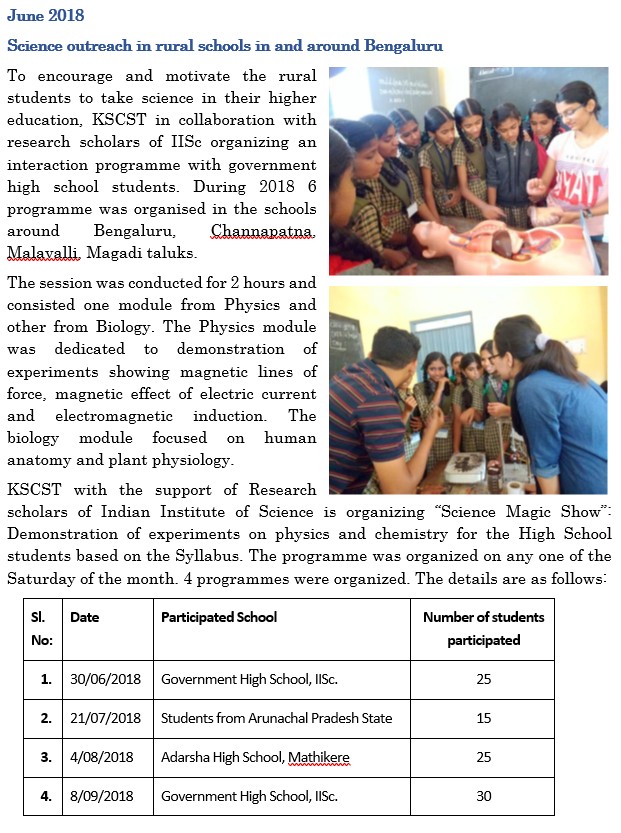|
|
Science
Outreach Activities: Igniting Curiosity in Rural Schools
K. N.
Venkatesh
Senior Project Engineer,
Karnataka
State
Council
for
Science
and
Technology
(KSCST)
Introduction
The
Karnataka State Council for Science and Technology (KSCST), established in
1975, is a leading autonomous organization under
the Department of Science & Technology, Government of Karnataka. For nearly
50
years, KSCST has been dedicated to advancing science
and technology for the betterment of society. Our work spans crucial sectors like
education, water, energy, and natural resource management. We collaborate with premier
institutions like the Indian Institute of Science to implement projects that improve
the socio-economic conditions of the people of Karnataka. KSCST also supports the
State Government in formulating S&T-based policies and provides assistance to
both State and Central Governments in various scientific endeavours.
Our
Commitment: Fostering a Passion for Science and Technology
KSCST
is deeply committed to cultivating a passion for science and technology among the
youth of Karnataka. Our Science Outreach Program is a key initiative designed to
bring the excitement of science and mathematics to rural schools, inspiring the
next generation of scientists.
Objectives
-
Engage
Students
and
Teachers: Promote active participation
in science-related activities.
-
Cultivate
Inquiry: Encourage students to ask
questions and explore their curiosity.
-
Embrace
Innovation: Expose students to the latest
advancements in science and technology.
-
Bridge
the
Gap: Foster meaningful interactions
between scientists and students.
-
Promote
Scientific
Thinking: Encourage critical thinking
and a deeper understanding of scientific concepts.
-
Inspire
a
Passion
for
Science: Convince students of the
intellectual value of science and cultivate a scientific mindset.
-
Empower
Future
Scientists: Encourage students to pursue
science in their higher education.
Science
Outreach Programme for Rural Schools: A Collaborative Effort with SFRI
-
Partnership
for
Impact: In collaboration with the
Science for Rural India (SFRI) initiative - a group of research scholars from
the Indian Institute of Science (IISc) - KSCST is conducting a comprehensive
Science Outreach Programme for rural schools.
-
Expanding
Reach: Initiated in
June
2018 in Government High Schools
near Bengaluru, the program expanded in
2019 and till date to include rural schools
in areas like Channapatna, Malavalli,
and Kolar, reaching schools within a
120
km radius of Bengaluru. This allows research
scholars to conduct outreach activities on Saturdays.
-
Reaching
Underserved
Communities: A team of IISc research
scholars, with support from the Department of Social Welfare, Government of
Karnataka, visits various schools, including:
-
Morarji Desai Residential School
-
Kittur Rani Chennamma Residential School
-
Dr. B. R. Ambedkar Residential School
-
Masti Venkatesha Iyengar Residential
School
-
Indira Gandhi Residential Schools
-
Government BBMP High Schools in and
around Bengaluru
-
Government Aided Schools in Bengaluru
-
Students from Arunachal Pradesh and
Assam, participating in the “Vigyana Darshan” Program.
-
Impactful
Interactions: The program includes:
-
Significant
Reach: Since
2018, KSCST has conducted Science
Outreach programs in over
60
institutions, benefiting approximately
5500 students.
-
Empowering
Students: The program targets high
school students from underprivileged communities (SC / ST / BC), with the goal
to:
-
Ignite
Curiosity: Conduct engaging experiments
and hands-on activities in Physics, Chemistry, and Biology, aligned with the
8th, 9th, and 10th-grade curriculum.
-
Build
Confidence: Instill a scientific temperament
and motivate students to pursue science.
-
Investing
in
the
Future: KSCST provides financial
support for the development of experimental kits and cover travel expenses
for IISc research scholars.
-
Strategic
Partnerships: Schools are identified in
collaboration with the Karnataka Residential Educational Institutions Society
(KREIS), under the Department of Social Welfare, Government of Karnataka, from
districts - Ramanagara, Tumkur, Chickkaballapur, Kolar, and Mandya.
-
Supported
by: This program is supported
and catalyzed by the National Council for Science and Technology Communication
(NCSTC), Department of Science and Technology, Government of India, and the
Department of Science and Technology, Government of Karnataka.
List of
experimental kits and experiments
/
demonstrations
Physics
|
Sl.
No.
|
Experiments
/ demonstrations name
|
Experimental
kit / materials available
|
|
1
|
Static electricity
|
Physics
electricity kit equipped with wires, Batteries, LED bulbs, switches,
multi-meter, magnets, nails, iron fillings
|
|
2
|
Electric circuits
|
|
3
|
Heating effects of electricity
|
|
4
|
Magnetic effects of electricity
|
|
5
|
Making electromagnetic coil
|
|
6
|
Conduction of electricity in liquids
|
|
7
|
Ignition temperature
|
Presentation
|
|
8
|
Extinguishing fire
|
Demonstration
|
|
9
|
Force
|
Demonstrations
|
|
10
|
Surface Tension
|
Water, nails, etc.
|
|
11
|
Pressure exerted by liquids and gases
|
Atmospheric pressure, using water,
card
|
|
12
|
History of transport (Motion and
measurement of distances)
|
Presentation demonstration
|
|
13
|
Laws of Reflection via plane mirror
and
convex and concave lens
|
Mirror, convex, concave mirror, plane
Lens, convex, concave lens, mirror/ lens holder, LED laser lights, glass
slab, prism
|
|
14
|
Types of reflection
|
|
15
|
Refraction through glass slab and
prism
|
|
16
|
Laws of refraction
|
|
17
|
Rainbow formation
|
Chemistry
|
Sl.
No.
|
Experiments
/ demonstrations name
|
Experimental
kit / materials available
|
|
1
|
Matter in our surroundings – states of
matter
|
Different
forms of matter demonstrations
|
|
2
|
Separation of components of a mixture
and Tyndall effect
|
Mixtures
and their separation techniques
Demonstrations
using simple mixtures
|
|
3
|
Malleability and ductility of metals
|
Demonstrations
of different malleable and ductile metals
|
|
4
|
pH indicator – natural and synthetic
|
Natural
indicators like turmeric, red cabbage, and synthetic like litmus to be used
to check pH of different solutions, confirmation using pH strips
|
|
5
|
Sea breeze and land breeze
|
Presentation
|
|
6
|
Temperature – types of thermometers
|
Demonstrations
via presentation and thermometers
|
Biology
|
Sl. No.
|
Experiments / demonstrations name
|
Experimental kit / materials available
|
|
1
|
Human Anatomy
|
Model
|
|
2
|
Organ systems – Digestive system
|
Demonstration using charts
|
|
3
|
Organ systema – Respiratory system
|
|
4
|
Organ systems – Circulatory system
|
|
5
|
Organ systems – Excretory system
|
|
6
|
Organ systems – Nervous system
|
|
7
|
Asexual reproduction in plants
|
Demonstration
using charts and live plant part demonstrations
|
|
8
|
Parts of a flower and sexual
reproduction in plants
|
Flower demonstrations and
explaining
Parts
of flower and sexual reproduction in plants
|
|
9
|
Pollination in plants
|
Demonstration via
presentation / chart
|
|
10
|
Heredity and Evolution
|
Demonstration via
presentation / chart
|
|
11
|
Plant cell/Animal cell visualization
under microscope and slide
preparation demonstration
|
Demonstrations using fixed
prepared slides under compound microscope.
Slide
preparation demonstrations will be given wherever feasible
|
|
12
|
Plant tissue
under microscope demonstration
|
|
13
|
Animal
tissue under microscope Demonstration
|
|
14
|
Mitosis
slides under microscope demonstration
|
|
15
|
Types of
pollen under microscope demonstration and pollen germination
|
|
16
|
Brain structure and function
|
Model demonstrations
|
|
17
|
Heart structure and function
|
|
18
|
Skeletal system
|



Click on the above link to view the full report
Few Photos of the event






|





